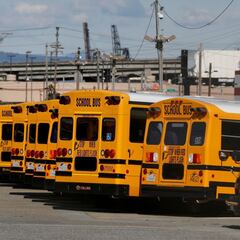Why does school start so early in August? First day back depends on where you live
Some students are already back in school, while others are still enjoying their summer vacation. The school year’s starting date depends on where you live.


There are still a few weeks of summer vacation left, but not for some students who are already back in school. A number of lucky ones can continue to go to the beach up until Labor Day.
The exact dates for when school starts vary widely across the country, with summer breaks differing from coast to coast. These differences are due to the unique needs of each state.
READ ALSO: The high cost of back-to-school shopping
Just a mom wondering when her kids are going back to school 😅
— Animal Planet (@AnimalPlanet) August 1, 2024
📸: Kathleen Reeder#opossum #wildlifephotography #joeys pic.twitter.com/64xrrWmIWV
Why does school start so early in August? First day back depends on where you live
Majority of K-12 students go through a school year that lasts around 180 days spread over 10 months, with an extended summer vacation.
According to studies conducted by the Pew Research Center involving over 1,500 public school districts, there are significant differences as to when that summer break will take place.
Southern regions usually start classes earlier than in the north. Last year, 19% of students went back to school before Aug. 7, the earliest starting classes from July 17 to 28, per the research.
READ ALSO: Harris’ stance on student loan forgiveness
More than two-thirds of the East South Central division, which includes Alabama, Kentucky, Mississippi, and Tennessee, began classes during the week of Aug. 7. Meanwhile, in the West South Central division which includes Arkansas, Louisiana, Oklahoma, and Texas, 94% were back in school between Aug. 7 and Aug. 18.
Most students in the New England states started school after the week of Aug. 28, while those in the Middle Atlantic states of New Jersey, New York, and Pennsylvania enjoyed their summer vacation all the way until Labor Day.
Related stories
The variation in dates can be attributed in part to state laws which provide a unique window for when students must go back to school.
The clustering of dates within regions could also have been the result of the convenience of having similar schedules within neighboring areas. For example, school districts would find it easier to hire teachers from nearby regions if they operated on a similar calendar.


Complete your personal details to comment